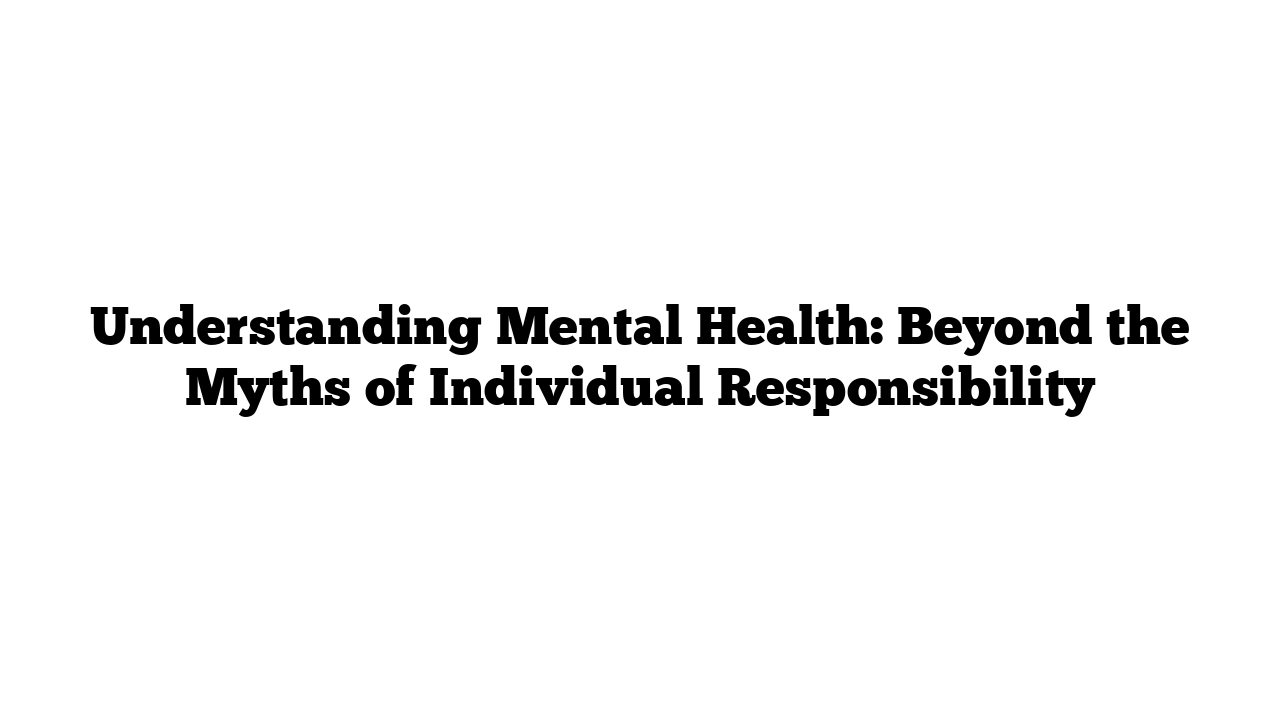In a world where we are constantly bombarded with messages about personal responsibility, the discussion around mental health often leads to the belief that individuals are solely accountable for their emotional well-being. While there is some truth to this notion—after all, seeking mental health support and making lifestyle adjustments are crucial steps in addressing issues like depression and anxiety—it’s essential to recognize that this perspective can be misleading.
The Concept of Magical Volunteerism
Mark Fisher introduces the term “magical volunteerism,” which captures the prevailing belief that we are fundamentally responsible for how we experience our lives. This notion is reflected in the myriad self-help books published each year, urging us to take complete control of our mental health. However, this perspective overlooks a vital aspect: our mental health is significantly shaped by our environments, not just our choices.
The Limitations of the Biomedical Model
The biomedical model of psychiatry has dominated modern approaches to mental health, often likening mental disorders to physical diseases with identifiable biological causes. While understanding neurotransmitters and neuromodulators is important, this approach tends to oversimplify the complexities of mental health.
As Joel Krier argues, “Our psychological capacities are realized not just by our brains but also by our bodies and the complex ways these bodies interact with their material and social environments.” This perspective emphasizes the need to consider how environmental factors interact with our brain function to shape our mental health.
Exploring Phenomenological Psychopathology
The field of phenomenological psychopathology encourages a more holistic understanding of mental health by examining the intricate dynamics between the brain, body, and environment. Instead of viewing mental disorders merely as issues of brain function, this approach highlights the embodied experience of individuals.
The goal here is to understand how mental disorders manifest not just in terms of symptoms, but as transformations in our experience of self, others, and the world around us. This perspective recognizes that mental health is a product of our lived experiences and the contexts in which we find ourselves.
The Role of Scaffolding in Mental Health
Krier identifies three types of scaffolding—embodied, social, and material—that support our mental health:
- Embodied Scaffolding: This refers to how our brain function is influenced by our bodies. For example, mood disorders, like depression, cannot be solely explained by neurotransmitters. Factors such as hormone levels, gut microbiome health, and even our facial expressions play a role. Research shows that individuals with facial paralysis report a reduced emotional spectrum, suggesting that our physical state directly impacts our mood.
- Social Scaffolding: Our interactions with others profoundly influence our mental health. The social cues we receive from friends, family, and broader cultural contexts shape our emotional experiences. For instance, individuals with autism often navigate environments lacking the social scaffolds necessary for fluid interactions. This is not an inherent deficit but rather a reflection of how societal structures can affect mental health.
- Material Scaffolding: The objects we interact with daily, from our smartphones to our notebooks, can significantly influence our emotional well-being. Whether they help us stay organized or serve as sources of stress, these material artifacts shape our experiences. In severe cases, such as schizophrenia, individuals may struggle to connect with the material world, leading to a disjointed sense of reality.
The Need for a Critical Perspective
While phenomenology offers valuable insights into our lived experiences, it can fall short if it doesn’t critically examine the societal structures that contribute to mental disorders. This critical lens is essential to dismantling harmful narratives that blame individuals for their conditions solely based on brain function.
“If we locate the source of their disorders within the brain alone, we perpetuate a harmful narrative,” argues Fisher. By acknowledging the various external structures influencing mental health, we can create a more inclusive and accommodating world for everyone.
Building a Supportive Environment
Understanding mental health as a complex interplay of brain, body, and environment invites us to rethink how we approach well-being. We all rely on external scaffolds to navigate our lives, and by recognizing this, we can foster environments that support mental health for everyone.
As the phenomenologist Maurice Merleau-Ponty suggests, “The job of the phenomenologist is to loosen the threads that connect us to the world in order to make them appear.” Only then can we identify areas for change and work towards creating a supportive world for all individuals.
In the pursuit of mental health, let’s remember that we are all interconnected. By understanding our experiences within a broader context, we can begin to dismantle the myths surrounding mental illness and work toward a more compassionate approach to mental well-being.
For more insights into mental health and related topics, feel free to explore articles on medicaltimes.io.
Additional Resources
- Anxiety and Depression Association of America
- American Psychological Association: Understanding Mental Health
- Verywell Mind: The Role of Environment in Mental Health
By embracing a broader understanding of mental health, we can foster a society that nurtures the well-being of all its members.
